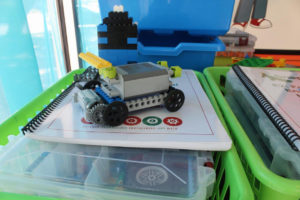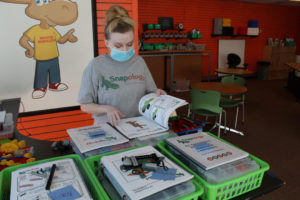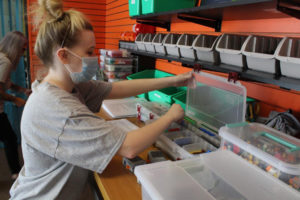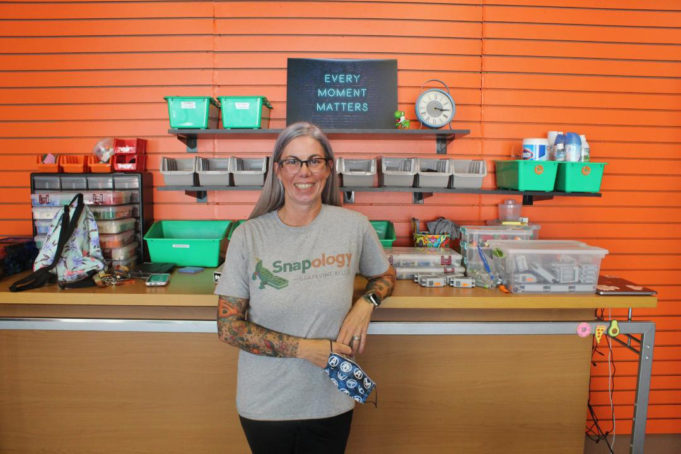Minutes before class started, Adisson Grant was preparing booklets and organizing special LEGO pieces for the day’s engineering lesson.
“We are teaching foundational engineering using machines and contraptions,” she said.
Nearby, large trays of carefully organized LEGO parts were open and ready for use. Piles of books showed the steps required to transform the small pieces into complex motors and other moving machines. Although the lessons gave the appearance of child’s play, the execution of each step is steeped in the rigors of science, math, engineering, and the arts.

Photo by Edward Brown.
“What they are doing is building intricate structures with moving pieces,” Grant continued. “Yesterday, we were working on motorcycles. We teach about mechanics and parts in motion. The builds they do reinforce the concepts they are working with.”
Grant, who holds a master’s degree in science education, chose Snapology as a means of teaching learning systems commonly known as STEM (science, technology, engineering, and mathematics) and STEAM (science, technology, engineering, arts, and mathematics) to children and teens. Snapology gives her the freedom to teach science without public school restrictions like mandated curriculum and state testing.
“I have health concerns, including fibromyalgia,” she said. “If I went to public school, I think it might kill me.”
Safety protocols were closely followed on the day I visited. Anyone who entered the room at Midcities Montessori in Bedford, myself included, had their temperatures checked. Students came and washed their hands after leaving their last classes. In a nearby room, Melanie Galaviz, the business’ owner, gave me an update on her struggling startup, which, like many small businesses across the country, has been devastated by the economic fallout of the COVID-19 pandemic.
“I am a science and math nerd,” she said. “When I was a kid, there were no role models for me. When you ask an elementary-age girl what they want to be, their answers are similar to the boys. They say they want to be a scientist, pilot, or engineer. Ask those same kids in middle schools, and they want to be teachers and nurses.”
Women are less likely than men to pursue STEM fields like computer programming and engineering. Gender stereotypes play a large role in those disparities, Galaviz said. One of her aims is to provide environments where girls can explore math and science with like-minded female peers.

Photo by Edward Brown.
“Research shows that if little girls continue to have positive role models, they can see themselves in a career in STEM or computer programming,” she said. “Finding girls who have similar interests at that age can be so powerful. When those pressures and [gender] stereotypes start coming as they become teenagers, they have each other. If we can get them at ages 8, 9, or 10 and help them find [friends with similar interests], they won’t be discouraged away from” STEM careers.
Galaviz, who is widowed with a 9-year-old son who was recently diagnosed with autism, believes in the efficacy of her learning programs, even if the public safety concerns have caused her enrollment to dwindle. The economic downturn and uncertainty about when schools will open have drained her life savings, she said, and her credit card bills are topping $15,000. Last year, she left a comfortable and well-paying corporate job to start her own Snapology using more than $100,000 that she had saved.
Her former job required extensive traveling, and, after her son’s diagnosis with autism, leaving that job meant the possibility of spending more time with her son and attending to his demanding learning needs.
“I felt that I was doing the right thing by being home and present with him,” she said. “Then I thought I was doing the right thing by opening my own business so I could learn how to help him better. Both of those things just blew up” after the coronavirus outbreak.
*****
Raising a child who has autism requires patience and a structured approach to parenting.
“My son is high-functioning,” Galaviz said. “His IQ is a point off of genius. When he was in kindergarten, he read all of the Harry Potter series. I had no idea that there was a learning difference with him until in public school. That is when everything got crazy.”
The precocious 9-year-old has the impulse control of a toddler, she added. When the mother realized her son wasn’t socially adapting to his classmates, a developmental pediatric doctor was hired to test for autism. Sevryn was diagnosed early last year.
“Our battles at home are around boundaries,” she said. “Our constant struggle is keeping him away from electronic devices. I’ve had to remove everything related to Snapology from my home. I can’t keep it in my house. I bought a safe [to hold electronic devices]. We talked about why.”
For Sevryn, several hours of playing with a tablet or smartphone feel like 20 minutes, she added. Sevryn recently tried to break into the safe. Galaviz has learned structure is important for her son, so homelife follows rigid schedules that save time for movie nights and playtime with their French bulldog.
One month after Sevryn’s autism diagnosis, Galaviz left her lucrative corporate job. Although that decision meant a rocky financial future after years of paying down debt following her late husband’s eight-year battle with cancer, the mother made the decision with her son’s future in mind.
Although Snapology activities, which focus on LEGO, robotics, and hands-on activities, cater to all learning styles, Galaviz was interested in the program because of what she said is a shortage of local STEM-based after-school programs. By learning the pedagogy behind Snapology’s curriculum, Galaviz thought she could make a living while learning about activities that cater to all types of learning, including children with autism.

Photo by Edward Brown.
Galaviz spent the next few months drafting a business and marketing plan, speaking to tax advisors, and delving into Snapology’s curriculum. Galaviz planned to live off her savings until September 2020 — the first month the business was projected to have enough profits to pay her four teachers and herself. After several months of preparation, Galaviz and her four teachers enjoyed their first peak season success, selling out spring break camps.
“I planned, tested, and evaluated talent, curriculum, logistics, marketing, and sales strategies for the entire year,” she recalled of that optimistic time. “When spring 2020 came along, we were tested, primed, and ready for an amazingly successful summer camp season.”
March 14 still looms in her mind. Fort Worth school district announced that spring break was extended for another week. Classrooms never reopened.
“That is where things stopped for my business,” Galaviz recalled.
Pivoting to virtual learning had moderate success, she said. Parents and children initially participated in free Zoom lessons that were offered just three days after Fort Worth schools announced reopening delays. When Galaviz tried charging for those same classes, attendance dropped immediately.
“From a revenue standpoint, we went from normal business to 10 to 20% through virtual classes,” she said.
Still, the new business owner was optimistic that summer classes could make up for the earnings shortfall.
“I thought, ‘Alright, it’ll make everyone slow down. I can get ahead,’ ” she recalled. “I began thinking about all the things I can do to get ahead, all the things you don’t have time to do when you are on the hamster wheel.”
Through March and April, she stayed in touch with established venues (daycares, schools, rec centers) that she hoped to work with and engaged with the local community by volunteering at pantry drives and doing other charitable work. It was during that tumultuous March that Galaviz became good friends with Midcities Montessori owner Kim Olstrup. The two were loosely acquainted, but the pandemic brought them together around a shared desire to provide safe learning environments for children.
“We were figuring ways we can help each other,” Olstrup recalled. “Melanie has a perspective on things that most people don’t have. None of us knew COVID was going to be to this degree. When we were trying to figure out summer, I offered [our library] to Melanie so kids who needed to get out had a place to go. We didn’t realize that no matter how hard we hit the pavement, we were up against something that no one has answers to.”
Olstrup said the economic pain has hit Mid-Cities residents hard.
“I have a lot of families that are coming in asking for help,” she said. “I lowered my tuition because everyone is in the same financial straits. We do a lot to give back. It’s all about community. As individuals, we may have financial woes. The big picture is that we see a need [for help in the community]. In a world that has become so hateful, there has to be people like Melanie out there to think of others.”
By May, Texas was reporting more than 50,000 COVID-19 cases. Even as students canceled summer camp commitments, Galaviz kept her commitments to the schools, hoping that loyalty would pay off in the future.
“We were able to start in-person summer camps in June,” she said. “I had 66 camps scheduled all over the Mid-Cities. I ended up running 14 of those. Most of the schools and daycares were not letting outside vendors into their buildings. The only ones who stayed open were the rec centers and the one private Montessori school that I had a space in.”
Financially, summer was a loss. Galaviz planned to draw her first paycheck from her new business in September. She’s nowhere near that goal, she said, and financial hardships have meant that two of her four teachers have had to find work elsewhere.
After an onerous application process that involved two financial institutions, Galaviz said she qualified for a few thousand dollars through the Paycheck Protection Program (PPP), the $669-billion forgivable federal loan program. The funds were spent within two weeks. The ongoing uncertainty about school reopenings has meant continued instability for Galaviz’ business. In a country that shies away from discussing financial hardships, parents have been surprisingly open about their difficulty finding funds for educational programs like Snapology.
Galaviz can relate to circumstances where financial burdens come without shame.
“When my husband died, I didn’t mind sharing the stress of debt because it wasn’t my fault,” she recalled. “I feel like that is what is going on with many people who have lost work because of COVID-19. It’s not so looked down upon.”
*****

Photo by Edward Brown.
Chris Strayer, vice president of the Fort Worth Chamber of Commerce, said COVID-19 has hit hospitality, retail, restaurants, and entertainment businesses especially hard. Early on into the pandemic, Fort Worth Chamber staffers began calling their 1,700 business members to listen to their needs.
“That gave us insight into the programming that companies needed to address their challenges,” he said.
Last March, retail companies were laying off and furloughing employees. Strayer said Fort Worth Chamber directors connected those displaced workers with new job openings in e-commerce and grocery stores. Another top concern for business owners was how to access financial aid like the federal PPP. Strayer said the Fort Worth Chamber developed webinars and online resources to guide business owners through the often-complicated application process.
While news stories abound of shuttered businesses and financial devastation, COVID-19 has provided new business opportunities for Fort Worth businesses that can pivot to meet the demands of a socially distanced economy, Strayer said.
“Many distilleries pivoted and made hand sanitizers,” he said, referring to Acre Distilling Company, Blackland Distillery, Firestone & Robertson Distilling Company, and others. Saddleback Leather Company “has started making hospital gowns and masks. Renfro Foods are doing great work.”
The U.S. economy shrank by 32.9% between April and June, according to government figures. The sharp economic contraction marks the worst quarter since World War II. In 2008, during the last economic crisis, the U.S. gross domestic product shrank by 8.4%, according to the financial services group Credit Suisse.
“On the financial side, the COVID-19 pandemic will be impactful, not only to the City of Fort Worth as an organization but to our local businesses as well,” said David Cooke, Fort Worth city manager, last April. “Fortunately, we entered this challenge in a strong position. The local economy was extremely strong, and the city was in a very strong financial position.”
After an initial estimated $23 million shortfall, the current annual loss is $16.2 million, partly due to “better than expected” sales tax earnings, according to a city spokesperson.
City staff has seen an 18% reduction in building permit activity. Still, as food pantry lines become a daily feature of life in Fort Worth, businesses are building and preparing for a post-COVID-19 period of growth and prosperity. In the North Side, Hotel Drover, which will feature 200 rooms and suites, a signature restaurant, meeting spaces, and a wedding barn, is opening early next year in the Stockyards.
Two large Near Southside projects — Tulips and Best Maid Pickle Emporium — are nearing opening dates. The emporium will soon feature retail and history lessons about the iconic pickle brand while Tulips, a much-needed mid-sized music venue, will initially come online as a blend of coffeehouse and cocktail lounge this fall.
Strayer is preparing to call Fort Worth Chamber members once again to see how their needs have changed six months into the pandemic. Whether the feedback is optimistic or dire, the chamber is prepared to allocate resources to support an ever-shifting business environment. One sign of hope: Companies from all across the United States are expressing interest in moving their headquarters to Fort Worth, he said.
Strayer said the chamber is ready to help local businesses, whether they are members or not. The chamber maintains a list of COVID-19 resources for businesses at FortWorthChamber.com/covid-19.
*****
Finding resources for a child with autism is expensive, and Texas offers little financial assistance for struggling parents, Galaviz said. Insurance programs that offer therapy for autistic children cost in excess of $12,000 a year for the two of them. Social skills classes run $125 an hour, meaning that Sevryn receives one such class per week at most, given the family’s tight budget.
After spending months qualifying her son for Medicaid, Galaviz said she was unable to find any Tarrant County therapists who offer applied behavior analysis (standard therapy for children with autism) and accept Medicaid. Without giving specifics, the mother said that her hopes for enrolling Sevryn in a public school program were abruptly canceled, meaning private school may be the only remaining option for addressing the special needs of her son.
“My mortgage becomes due October, and I feel confident that with no additional support, I have until just after Christmas before I am completely out of all emergency money and savings,” she said, adding that her last option would be to sell her home and to live off that equity for as long as it lasts.
Even with that dire possibility on the horizon, Galaviz is cautiously optimistic that student enrollment will improve once parents sort out where their children will go to school this fall. Although enrollment is low, she has after-school programs scheduled at recreational centers in Colleyville, Southlake, Keller, and North Richland Hills.
The small business owner struggles with the fact that a lifetime of making sound financial decisions hasn’t protected her from being on the verge of bankruptcy and financial ruin.
“I did everything they tell you to do,” she said. “After I was widowed, I spent years paying off all the debt that [came from eight years] of cancer treatments. Then I bought a home, invested, and started a college fund for my son. I bought life insurance and annuities, and I saved.”
Galaviz and Olstrup are in the process of growing weekly community events at Midcities Montessori. For the first time, food trucks will be part of the attraction, along with the Pumpkin Hallow (an indoor pumpkin patch). The two friends are in close contact with Bedford city officials to find ways to help local families who are in need. If the efforts create more visibility for the Montessori school and Snapology, Galaviz and Olstrup welcome it, but the main goal is to be a resource for struggling families.
Olstrup said she worries about homebound children.
Many parents “don’t know how to educate kids, so they are plopping them in front of a computer,” Olstrup said. “Mom and Dad aren’t educators. To her defense, Melanie is doing everything to get her name out, but COVID is keeping them home.”
Strayer’s advice for local consumers is to support small, local businesses however you can. He hopes that members of the business community will share lessons and best practices for operating during a pandemic with fellow business owners.
Fort Worth’s business community is “in this together,” he added. Despite the serious challenges facing local businesses, Strayer said, Fort Worth remains one of the most attractive locations for businesses to transfer operations to.
“From an economic development perspective, we have 106 projects in our pipeline,” he said, referring to data-gathering efforts by companies considering moving to Fort Worth. “That’s the most I’ve seen in three years. A lot of companies are [preparing] to move in and create jobs.”
The reasons, he continued, are simple.
“We are experiencing tremendous growth,” he said. “And we can supply a skilled workforce. With DFW airport and BNSF Railway [headquartered here], you can get your goods in quickly and out quickly.”
Visit South Main Street or the West 7th corridor and semblances of normalcy can be seen returning to those pockets of Fort Worth. The recovery in Tarrant County will inevitably be uneven with some businesses returning to pre-COVID earnings soon while other businesses permanently shutter or find themselves burdened with debt for years or decades to come.
Even as she struggles to keep her business afloat, Galaviz is working closely with Olstrup to volunteer where needed or to create new resources for residents of Bedford and nearby Hurst. The pandemic has provided opportunities to become a resource for the community that Galaviz believes will one day rebound.
When her husband was sick, she said she never could have “made it through without the help of the people” in her community. “I always remember that and try to surround myself with people who have that same inner drive. I do believe that people will remember the organizations who were there when times were bad.”












